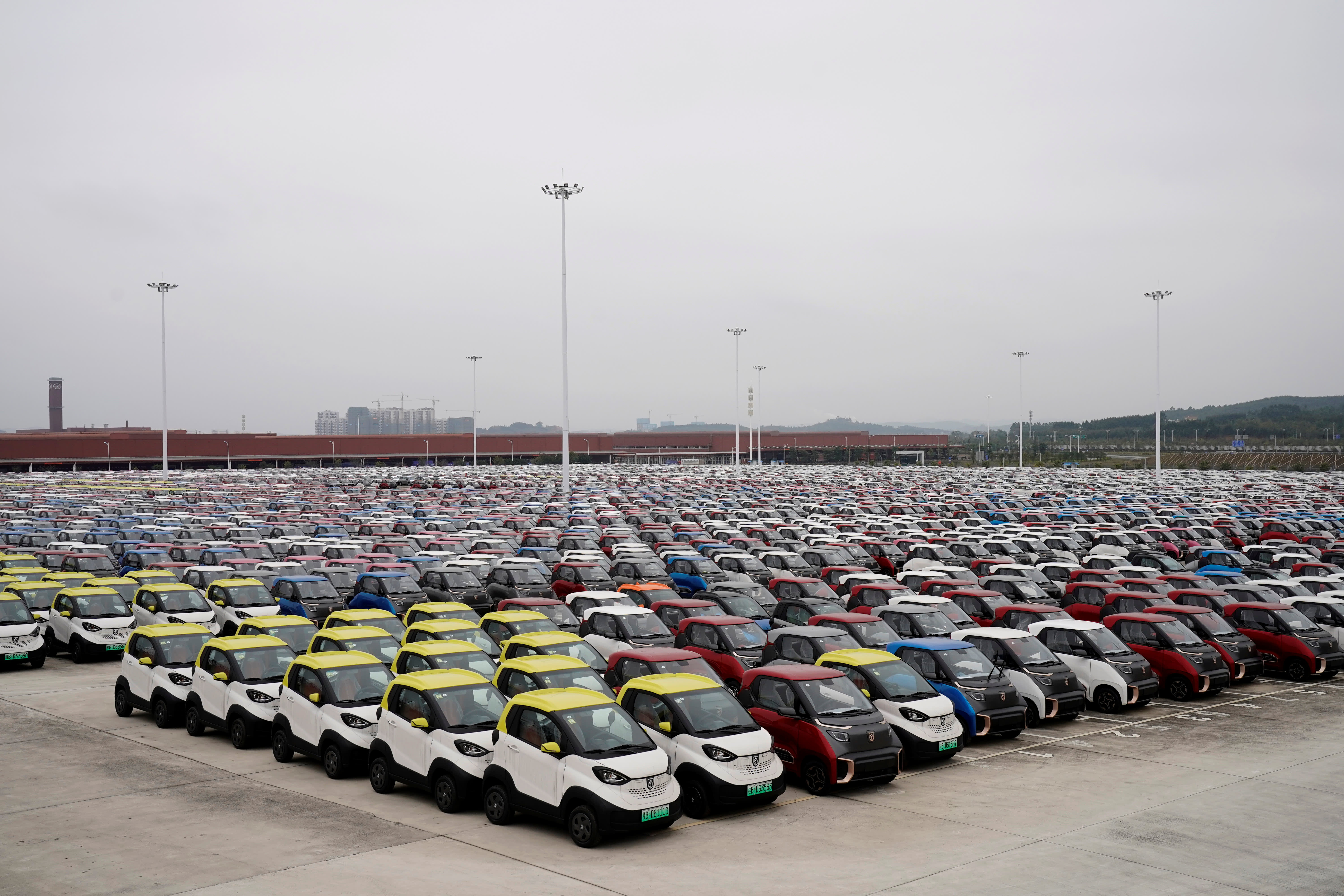Is America Ready For China's Electric Vehicle Domination?

Table of Contents
China's EV Manufacturing Prowess: A Technological and Economic Powerhouse
China's ascendancy in the EV sector isn't just a matter of ambition; it's a demonstrable reality fueled by massive production capacity and strategic government support.
Massive Production Capacity and Lower Costs
China boasts a colossal scale of EV production, far surpassing many of its competitors. This is driven by several factors:
- Gigafactories and Economies of Scale: Chinese EV manufacturers like BYD, NIO, and Xpeng operate massive manufacturing facilities, leveraging economies of scale to significantly reduce production costs. This allows them to offer competitive pricing in both domestic and international markets.
- Extensive Battery Supply Chain: China controls a significant portion of the global supply chain for EV batteries, from raw material extraction to cell manufacturing. This vertical integration reduces reliance on external suppliers and contributes to lower overall costs.
- Government Subsidies and Incentives: The Chinese government has heavily subsidized the EV industry through various incentives, including tax breaks, research grants, and infrastructure development. This proactive approach has accelerated the growth of the sector.
Technological Innovation and Advancements
Beyond sheer scale, China is making significant strides in EV technology:
- Battery Technology Breakthroughs: Chinese companies are at the forefront of developing advanced battery chemistries, such as lithium iron phosphate (LFP) batteries, known for their cost-effectiveness and safety. Innovations in solid-state batteries are also emerging from Chinese research institutions and companies.
- Charging Infrastructure Development: China has invested heavily in building a nationwide network of charging stations, making EV ownership more convenient and accessible for consumers. This contrasts sharply with the still-developing infrastructure in many parts of the US.
- Autonomous Driving Systems: Chinese companies are actively developing and deploying advanced autonomous driving systems, incorporating AI and machine learning to enhance vehicle safety and performance.
The Current State of the US Electric Vehicle Industry: Strengths and Weaknesses
While the US possesses some strengths in the EV market, significant challenges remain in competing with China's rapid advancements.
American EV Makers: Catching Up or Falling Behind?
American EV manufacturers like Tesla, GM, Ford, and Rivian are making progress, but they face a steep climb:
- Production Capacity Gap: While Tesla has established significant production capacity, other US manufacturers are still scaling up their EV production to meet growing demand, lagging behind China's massive output.
- Technological Parity: While US companies are innovating, China's aggressive investment in R&D, especially in battery technology and autonomous driving, presents a considerable technological challenge.
- Market Share Comparison: The market share held by Chinese EV manufacturers in their domestic market, and increasingly in global markets, significantly surpasses that of most US counterparts.
Infrastructure and Policy Challenges
The US faces significant challenges in supporting the growth of its EV industry:
- Charging Infrastructure Deficit: The US lags behind China in the development of a comprehensive nationwide charging network. This lack of infrastructure hinders EV adoption and creates range anxiety for potential buyers.
- Government Policy and Support: While the US government has implemented some incentives like tax credits, more substantial and coordinated policies are needed to match China's proactive approach.
- Regulatory Environment: Streamlining regulations and permitting processes for EV manufacturing and infrastructure development is crucial to accelerate the growth of the US EV industry.
The Geopolitical Implications of China's EV Dominance
China's growing dominance in the EV sector carries significant geopolitical implications for the United States.
Supply Chain Dependence and National Security
The US's reliance on China for certain EV components and raw materials poses a significant national security risk:
- Critical Minerals Dependence: China controls a substantial portion of the global supply of critical minerals essential for EV battery production, such as lithium and cobalt. This dependence creates vulnerability to supply chain disruptions.
- Battery Material Sourcing: The concentration of battery manufacturing in China increases the risk of dependence on a single supplier, posing risks to US EV production.
Global Market Share and Economic Competition
China's capture of a major share of the global EV market would have profound economic consequences for the US:
- Job Losses in the American Auto Industry: Failure to compete effectively could lead to job losses in the US auto industry, impacting related sectors and the overall economy.
- Increased Trade Deficit: Increased imports of Chinese EVs could exacerbate the US trade deficit, further straining the nation's economic balance.
- Global Economic Influence: China's dominance in the EV sector would significantly enhance its global economic influence, potentially impacting trade relations and international power dynamics.
Conclusion
China's rapid advancements in the electric vehicle sector pose a significant challenge to the United States. While American companies possess strengths, they face a formidable competitor with massive production capacity, substantial government support, and a rapidly advancing technological edge. The geopolitical implications of allowing China to dominate the EV market are substantial, impacting national security, economic stability, and international relations. The need for urgent action to strengthen the American EV industry is undeniable. We must invest in domestic manufacturing, develop robust charging infrastructure, implement supportive government policies, and diversify our supply chains. Is America truly ready for China's electric vehicle domination, or is it time for a strategic shift? Research government policies related to electric vehicles, and advocate for supportive legislation to foster the growth of the US EV sector – the future of our automotive industry depends on it.

Featured Posts
-
 Depraved Paedophile Jailed Joint Police Operation Secures Conviction
May 04, 2025
Depraved Paedophile Jailed Joint Police Operation Secures Conviction
May 04, 2025 -
 Pimblett Vs Chandler Referee Warning Requested Ahead Of Ufc 314 Bout
May 04, 2025
Pimblett Vs Chandler Referee Warning Requested Ahead Of Ufc 314 Bout
May 04, 2025 -
 Offshore Wind Farm Costs Why Energy Companies Are Hesitating
May 04, 2025
Offshore Wind Farm Costs Why Energy Companies Are Hesitating
May 04, 2025 -
 Darjeelings Slow Moving Traffic A Growing Concern
May 04, 2025
Darjeelings Slow Moving Traffic A Growing Concern
May 04, 2025 -
 Thunderbolts Will This Team Save The Mcu
May 04, 2025
Thunderbolts Will This Team Save The Mcu
May 04, 2025
Latest Posts
-
 Bianca Censori And Kanye West Repairing Their Relationship
May 04, 2025
Bianca Censori And Kanye West Repairing Their Relationship
May 04, 2025 -
 Kanye West And Bianca Censori Marriage Challenges And Progress
May 04, 2025
Kanye West And Bianca Censori Marriage Challenges And Progress
May 04, 2025 -
 Kanye West And Bianca Censori A Report On A Troubled Marriage And Alleged Control
May 04, 2025
Kanye West And Bianca Censori A Report On A Troubled Marriage And Alleged Control
May 04, 2025 -
 Are Kanye West And Bianca Censoris Marital Problems Solvable
May 04, 2025
Are Kanye West And Bianca Censoris Marital Problems Solvable
May 04, 2025 -
 Cutout Bodysuit And Tights Angelinas Fashion Statement
May 04, 2025
Cutout Bodysuit And Tights Angelinas Fashion Statement
May 04, 2025
